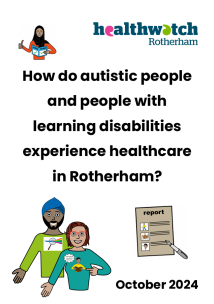How do autistic people and people with learning disabilities experience healthcare in Rotherham?

We know autistic people and people with learning disabilities face health inequalities which means they may not live as long or have the same access or quality of care as others.
Through our engagement work, we have heard that their needs are not always met by healthcare services and we wanted to provide people with the opportunity to let services know how they could improve.
51 people completed our survey and we also heard from an additional 14 parents and carers.
Our key findings were:
- Not everyone is given reasonable adjustments
- Not everyone knows about health passports
- Hospital and GP waiting areas need to be better
- Communication could be better
- People don't always feel listened to
- Not everyone is having an annual health check
- People feel safe
- Specialist support is good
Our recommendations were:
- Quiet spaces for people to wait in
- Longer appointment times to be offered
- Appointment letters to be written in easy read
- Patient information to be available in easy read
- A reasonable adjustment flag to be placed on patients records
- Health passports to be offered to autistic people and people with learning disabilities
- A flag to be put on patients records to show they have a health passport
- All staff to receive training on health passports
- Health passports to be looked at as part of the annual health check
- Everyone who should have an annual health check to be offered one
- All staff to have training on how to talk to autistic people and people with learning disabilities
- GP's to consider giving autistic people and people with learning disabilities 2 named doctors to oversee their care
